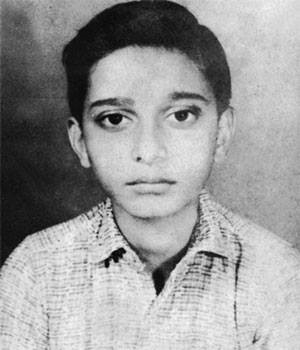
‘Mom, I’m going to the procession. If I don’t return, you think your son has given his life for the people of Bengal.
Yours Matiur Rahman Mallick,
Tenth class, Nabakumar Institute. ‘
Father Azhar Ali Mallick.
National Bank Colony, Motijheel. ‘
Matiur Rahman Mallik the date of birth and death of this teenager who sacrificed his life in the mass uprising of 1971 is the same. Just 16 years ago, on the day he came to light (January 24, 1953), he passed away on the same day (January 24, 1969), 16 years apart! Sometimes such whimsical matches of dates make us think a lot.
A teenager, only sixteen years old. Passed the ninth class and barely got up to the tenth class. He was a meritorious student of the science department of the Nabakumar Institute, a traditional school established in 1918 at Bakshibazar in old Dhaka. His name was Matiur, full name was Matiur Rahman Mallick.
His father Azhar Ali Mallick was a bank employee. Quite a tense family. Despite being the son of such an ordinary family, Matiur Rahman Mallick’s name is bright in the history of Bengal’s independence. We remember him with absolute love, respect and glory. That Moti or Matiur Rahman Mallick of that day is known as Shaheed Matiur today. The courage and self-sacrifice of young Matiur at one stage of the long struggle against the Pakistani rulers after which Bangladesh gained independence.
On January 20, 1989, after Assad’s death, the students who came to the struggle used to bring their addresses in their pockets. In the notes found in the chest pocket of the young martyr Matiur, who sacrificed his life for the country, the vastness of his pure patriotism that the countrymen can see – seems to outweigh the vastness of the horizon and the vastness of the sea. In protest of Assad’s assassination, the Central Student Struggle Council announced a three-day statewide (East Pakistan) program. Torch procession on 23rd and strike till 2 pm on 24th. During the strike on the 24th, students and people came down to Dhaka from the morning. Protesting highways. The clash escalated when the minister’s house on Abdul Gani Road next to the secretariat was attacked. Four people, including Maqbool and Rustam, were killed along with Matiur, a 10th class student of Nabakumar Institute, when police opened fire on the protesters. When the news spread everywhere, the people of Dhaka took to the streets in protest. The fire blazed in Dhaka. Daily Pakistan, Morning News Office, MNA Laskar’s house in Puran Paltan were on fire. Justice SA Rahman Lungi later escaped with his life when the house of a special court judge in the Agartala conspiracy case was attacked. The struggle that the students and the people of this country took on January 20, 1989 by touching the blood of Assad in the Shaheed Minar, on January 24, the struggle was completed in the blood of Matiur.In case of a mass uprising on January 24, the deadline for evening law was extended to January 25, 26 and 27 after 3 pm. People disobey it and come down on the highway like a flood. The heartbreaking scene that unfolded when Matiur’s body was taken to his mother in the evening law was felt by the students of the day only with their hearts, but it is impossible to express it in the language of the pain-laden environment. The mother of Matiur, a simple and majestic woman from an ordinary Bengali family, brought the body of her child in front of her and said that day, “My child’s blood should not be wasted.” The blood of Shaheed Matiur, a teenage soldier of the mass movement of 1971, was not wasted. The mass uprising of 1969 was the culmination of his bloodshed. As a result, the military dictatorship ended Ayub’s rule. This was followed by the elections of 1970, the victory of the Bengalis in the elections, the various deceptions, deceptions of the next dictator Yahya Khan in the transfer of power and finally the great war of liberation and the birth of an independent sovereign Bangladesh.
The teenage martyr Matiur is not just an indomitable motivator of the historic mass uprising. His self-sacrifice will forever be remembered in the history of the great liberation struggle and independence of the Bengalis. Martyr Matiur is a symbol of courage and strength for the youth. Adolescents can also stand up against injustice for the sake of the country and give their lives without fear. Shaheed Matiur of ’69 has left that example for us. Acknowledgments: Late Azhar Ali Mallick (Martyr Father)
Translation Credit: Our heartiest gratitude goes to Sreemoyee Mazumder, for her wonderful and kind support.